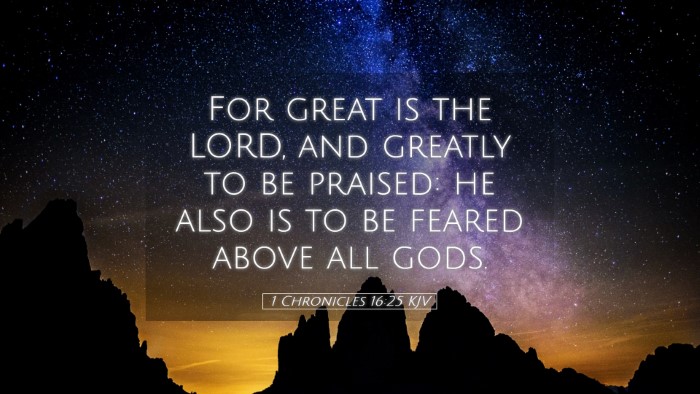Commentary on 1 Chronicles 16:25
Verse Context: 1 Chronicles 16:25 states, “For great is the LORD, and greatly to be praised: he also is to be feared above all gods.” This verse is part of David's song of thanksgiving to God after bringing the Ark of the Covenant to Jerusalem, emphasizing God's supremacy.
Understanding the Verse
This verse encapsulates the grandeur and holiness of God. Both Matthew Henry and Albert Barnes illuminate this with their insights, providing a profound theological foundation for understanding God's attributes as presented in this passage.
The Greatness of the Lord
Matthew Henry reflects on the phrase "For great is the LORD," asserting that God's greatness is manifested in His creation, governance, and grace. This highlights not only His power but also His benevolence towards humanity. To consider God's greatness is to recognize His infinite wisdom and authority, which are beyond human comprehension.
Worthy of Praise
The phrase "and greatly to be praised" stresses the importance of worship in the believer's life. Albert Barnes comments on the nature of praise, noting that it should arise from a true understanding of who God is. Praise is not merely an obligation, but a natural response to God's character. Engaging in worship reflects an acknowledgment of His goodness and majesty.
God’s Fear and Reverence
Henry also emphasizes the phrase "he also is to be feared above all gods," interpreting it as a call for reverence. The Bible consistently portrays the fear of the Lord as the beginning of wisdom (Proverbs 1:7). This fear is not about terror but a deep respect and recognition of God’s authority and holiness. It encourages believers to approach God with both gratitude and humility.
Theological Implications
Adam Clarke elaborates on the duality of praise and fear in the relationship between God and humanity. He argues that true worship encompasses both a joyous acknowledgment of God's greatness and a sober recognition of His holiness. Clarke suggests that this balance is crucial for a mature faith, where emotional expressions of love for God are grounded in the realization of His transcendence.
Application for Believers
This verse serves as a foundational teaching for both personal and communal worship. Barnes points out that when believers come together to worship, they should be intentional about exalting God’s greatness. The collective declaration of God’s supremacy sets the tone for reverent and heartfelt praise that resonates throughout the community.
Historical Context
Understanding the context of this verse within the narrative of 1 Chronicles is essential. David's act of bringing the Ark to Jerusalem was not merely a political move; it was a spiritual declaration. Henry notes that this act highlighted the centrality of God in the life of Israel, reinforcing the idea that their identity was deeply intertwined with their worship of Yahweh, the one true God.
Conclusion
In summary, 1 Chronicles 16:25 is a rich verse calling believers to extol the greatness of God, to engage in heartfelt praise, and to cultivate a reverent fear of Him. This profound understanding of God’s greatness, as elucidated by public domain commentators such as Matthew Henry, Albert Barnes, and Adam Clarke, provides valuable insights for pastors, students, theologians, and scholars. These insights not only enhance theological education but also encourage a deeper, more meaningful worship experience.


